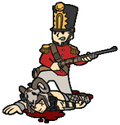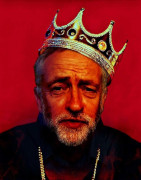|
Alekanderu posted:Guerrilla warfare is something you do because you have to, not because you want to. Everyone has to do it without wanting to, then. When was the last war where there were no guerrilla or commando operations behind enemy lines? The difference between regular forces and guerrillas was a lot clearer 300 years back but in contemporary setting drawing a distinction is harder. If guerrilla warfare is your sole form of fighting then you're in a dire disposition, though.
|
|
|
|

|
| # ? Jun 10, 2024 12:16 |
|
The Merry Marauder posted:Don't discount Greene's Southern Campaign, either, but yeah, dumping all the credit on the French is an incorrect distillation. Yeah, definitely. I think if you were to boil it down to the root causes, American success in the Revolutionary war looks something like this: 1. Washington's Continental Army wins a couple high profile battles at Trenton and Saratoga to convince the French that they're legitimate enough to support, in the meantime they avoid getting encircled and annihilated. 2. Independently organized militias harass British troops to the point they are confined to urban areas and large mobilized armies, driving up the cost of the war and causing the need for a steady stream of reinforcements from across the Atlantic. 3. The French Navy and Army is deployed and wins a couple of decisive battles. The British, having been forced to fight a low grade war for almost a decade, does not have the taste for pitched battle with a Great Power. Cue Yorktown. All three of these things needed to have happened for the Americans to have been successful. Washington's Army was necessary to convince the French we were an actual country, the militias were necessary to make the war costly for the British, and the French, and particularly the French Navy, were necessary to actually win.
|
|
|
|
France's greatest contribution to the American victory didn't even involve US soil, it was the naval threat (the French Navy was superior to anything the RN could bring to bear) and especially the threat to British interests in the Caribbean. Britain knew that even an independent America would rely heavily on them for trade, but if France took their economic interests in the West Indies it would be an enormous hit. The British Army in North America basically stopped getting reinforcements and the Royal Navy was split into three major theaters in the Atlantic: the West Indies, the US coast, and defending the British Isles from a literal invasion (which was a fair bit of paranoia but not completely unwarranted). Talking about American irregulars usually lumps militia in with the frontier rangers...these were very different forces and deserve their own separate recognition. Yorktown was a combination of US tactical success and ridiculous decisionmaking by the British. Cornwallis' army was hurting after running across the Carolinas and taking heavy casualties all along the way, but he was planning on moving north to join up with the northern army until he received orders to basically stay put. It blows my mind that he settled at Yorktown, because he even commented that it was a lousy location. Godholio fucked around with this message at 21:08 on Jan 16, 2013 |
|
|
|
Xiahou Dun posted:How true is the chestnut about Americans using "guerilla tactics" in the American Revolution? I know they obviously didn't invent it, as is taught, so I assume the rest is bullshit. The impression I have is that traditional European formations were very poor for some of the battles fought. This example is from the French and Indian War, which Gen. Washington had some experience in: Crucible of War: The Seven Years' War and the Fate of Empire in British North America, 1754-1766 posted:It was about one o'clock when Scarouady and Croghan spotted the French and Indians through open woods, no more than two hundred yards to their front. The French party, surprised, halted to organize itself. Gage's men hurried forward and fired three quick volleys; despite the great range, one of the balls killed Captain Beaujeu as he stood in front of his men, waving his hat to direct their disposition. The sudden loss of their commander threw the regulars and militiamen into confusion, but the Indians needed no one to tell them what to do. Streaming into the forest along either flank of the British force, they took up positions wherever they found cover: behind trees, in a defile, on a hill to the column's right. Then they began to pour fire into the British advance guard, which responded with a few ineffectual volleys and began to fall back ... Obviously 'trapped the British in the woods' wasn't a strategy you could rely absolutely on, and militia generally did poorly in a stand-up slugging match. For things like Yorktown (http://en.wikipedia.org/wiki/Siege_of_Yorktown), regular troops were absolutely required. Note there that there was still a fairly heavy dependence on French regulars (and French naval support).
|
|
|
|
I just finished reading Fred Anderson's Crucible of War: The Seven Years' War and the Fate of Empire in British North America, 1754-1766, which covered what I was always taught to call the French & Indian war. Anderson definitely suggests that most British regulars arrived in America trained only for volley fire in the Continental style, which was almost completely ineffective against an enemy who used terrain for cover and didn't form ranks. The redcoats could certainly be taught how to counter such tactics and, when that training was added to their foundation of strong discipline, could fight very effectively. The retraining process required commitment from the officer corps, which usually required an officer who'd learned the hard way, or took orders from someone who had. tallkidwithglasses's point about driving up the cost of war is well-taken too. In friendly or pacified country, you can supply troops with nearly civilian transport. In country infested by irregulars every wagon full of supplies needs to be guarded or it will not only fail to arrive, it will be used to supply the enemy. You can fritter away a regiment of troops just trying to keep a fort garrisoned and supplied and still be unable to effectively project power. The lesson I took from the book is that independence on some scale was inevitable simply because the (in modern terms) the latency and bandwidth of transatlantic communication was insufficient to provide Parliament with enough information to govern the Colonies effectively. Even the most pro-American MPs didn't really understand conditions on the ground in America, and maybe half those who made the trip refused to accept them.
|
|
|
|
Frontier rangers developed in response to Indian tactics...they literally copied how the Indians lived and fought in the woods. Regular troops had no training in that arena, and rangers/Indians had no chance against veteran regulars in line formation. In almost every example over several centuries, the winning side was the one that fought on their own terms (except in ridiculously overwhelming numbers). If the regulars were in the woods, they were thrashed...irregulars in the woods did very well up until a regular officer would take charge in pretend that a couple of weeks of drilling made them a conventional army. Edit: The First Way of War: American War Making on the Frontier, 1607-1814 by John Grenier is an excellent book on this.
|
|
|
|
VikingSkull posted:The US after WWII had a ton of military equipment based on German designs, such as the M60 machine gun being a derivative of the MG42. On the Soviet side, Mikhail Kalashnikov based the AK-47 design on the StG 44. Neither of these examples is entirely correct. The M60 borrowed many mechanical elements from the FG42, which the Germans had developed for the paratroopers. It was a lightweight select-fire rifle in 8mm Mauser, which was intended to supply paratroopers with the firepower of a light machinegun in a package little larger than a standard service rifle. It was ahead of its time but not exactly successful. It was mostly unsuitable for automatic fire, because the full-power cartridge and light overall weight made for excessive recoil, and the fixed barrel meant it was prone to overheating. The ergonomics were also somewhat questionable. The M60 used somewhat fewer design features from the MG42 (IIRC just the feed system) but was definitely based on it conceptually, as a GPMG that could be used with a bipod in the squad LMG role, or on tripod as a fixed defensive weapon. The M60 isn't a very good weapon, incidentally, mainly due to mechanical unreliability. Contemporaneous weapons systems in the same category, like the FN MAG, Soviet PK series, or the MG42 itself (in its updated incarnation as the West German MG3) were superior in most respects. The US stuck to the M60 and kept trying to improve the design for quite a while, before finally giving it up and adopting the MAG (as the M240 series). As to the Kalashnikov, its design is not based on the StG 44. They have similar layouts and both fire bottleneck cartridges, meaning both have curved magazines, which creates a vaguely similar outline. This is deceptive, however, and mechanically the weapons are quite different. At best it can be argued that the StG44 was a proof of concept for Soviet weapons designers, which demonstrated that a select-fire rifle in an intermediate cartridge could be very useful. Many countries had experimented with intermediate cartridges in the interwar period, including the USSR, and the success of the StG44 was a spur to development. quote:The Germans did more in WWII to help the Cold War arms race than just about any nation on Earth. Some of Germany's wartime advances proved significant in the long run, but this is a tremendous exaggeration.
|
|
|
|
Beaten to the AK-47!=Stg44 bit. They look similar on the outside, that's about it. If you really care, there's a very detailed piece by piece comparison of both weapons floating around TFR. They are really nothing alike.
|
|
|
|
I dunno if its a tremendous exaggeration. The German Rocket program definitely influenced both superpowers in the development. That alone right there can be traced to a lot of the cold war's technology.
|
|
|
|
Nenonen posted:If guerrilla warfare is your sole form of fighting then you're in a dire disposition, though. Yes, that's what I was referring to. If you can beat the enemy in a standup fight then that will almost always be preferable to guerrilla war, since you can't really hold on to territory otherwise. Guerrillas are really hard to defeat, but they also have a hard time actually defeating anyone else. Alekanderu fucked around with this message at 23:30 on Jan 16, 2013 |
|
|
|
Saint Celestine posted:I dunno if its a tremendous exaggeration. The German Rocket program definitely influenced both superpowers in the development. That alone right there can be traced to a lot of the cold war's technology. The tremendous exaggeration lies in the leap between "German rocketry influenced later related work by the USA and USSR" and "The Germans did more in WWII to help the Cold War arms race than just about any nation on Earth."
|
|
|
|
Are there any good examples of guerrila warfare working before the 19th century? Napoleon in Spain was the first i can recall, but that's mainly because Spain wasn't the main focus of the war, being the route to Portugal where the Anglo-Portuguese troops fought as a regular standard force. When it came to kick the French out it was indeed necessary to use standard army tactics so i guess that doesn't count as a ~~true~~ guerrila win technically.
|
|
|
|
There's no question that German-like innovations can be seen on substantial amount of Cold War technology. But I'm not sure that means the Germans had their fingers in every pie. Let's look at a couple of examples from military aviation. Some things, like the wing design of the F-86 Saber were drawn directly from German technical data. The swept wings gave better performance at high speeds, reducing drag and resolving some problems with aerodynamic compressiblity. Now, this wing shape leaves something to be desired when it comes to low speed handling. So, the North American engineers installed leading edge wings slats. Both of the these were drawn from German experience with aircraft like the Me 262. So, in some cases, you do have examples where German influence was tangible and meaningful. This isn't to say that the Germans were the only ones who could have solved these problems, they just ran into them first and solved them first. The United States had NACA and the Soviet Union had its various design bureaus, both of whom had the technical proficiency to solve the new issues aircraft were encountering. But left to their own devices, resolving certain technical challenges would have taken longer, so German information and expertise did speed things up a bit. On the other hand you have cases were it looks like German advances influenced Western and Eastern technology, when it fact there was very little influence. In these cases, technological evolution was parallel, not linear. You get cases like Jack Northrop's flying wings and the work of the Horten brothers (e.g. the Ho 229), both of which look very similar and are conceptually similar. But they were developed in parallel and neither meaningfully influenced the other. The same holds true for examples other people have brought up before, like the AK-47/StG-44 comparison.
|
|
|
|
Mans posted:Are there any good examples of guerrila warfare working before the 19th century? Napoleon in Spain was the first i can recall, but that's mainly because Spain wasn't the main focus of the war, being the route to Portugal where the Anglo-Portuguese troops fought as a regular standard force. When it came to kick the French out it was indeed necessary to use standard army tactics so i guess that doesn't count as a ~~true~~ guerrila win technically. When the Persians invaded Scythia, the Scythians burned the fields, poisoned the wells, and harassed the army without ever having a stand-up fight. Eventually they turned to retreat and were chopped up piecemeal all the way back to the Hellespont. Chinese expeditions into the northern steppes suffered similar fates (with the occasional disasterous massacre). Dunno if that's what you'd call a guerilla war, since they were nomadic tribes avoiding battle, but there are quite a few ancient examples of armies using these tactics to defeat a conventional force. I mean, part of the issue is that the classic example of a guerrila is a civilian with a gun that hides amongst the civilian population, because without access to weapons that are easy to use, it is hard to really inflict casualties on a professional army. Other than by starving them or denying them supplies.
|
|
|
|
The Merry Marauder posted:
Is it actually possible to win an irregular war?
|
|
|
|
Philosophically? No. Politically? Sure, you just need to convince the other guy to quit, or over-commit. And yeah, Mans, as we've peripherally discussed, the Jersey militia and Continental detachments rendered it necessary for simple dispatches to be escorted by a troop of cavalry. Henry Clinton was not totally irrational in remaining ensconced in New York. It's a victory for the strategy, if not in the overall war.
|
|
|
|
Boiled Water posted:Is it actually possible to win an irregular war? For who, the irregulars or the government? The irregulars can win by staying alive and active. They already "home", there's no where else to go. The government can win by winning over thw people which usually involved some kind of political consensus.
|
|
|
|
Mans posted:Are there any good examples of guerrila warfare working before the 19th century? Napoleon in Spain was the first i can recall, but that's mainly because Spain wasn't the main focus of the war, being the route to Portugal where the Anglo-Portuguese troops fought as a regular standard force. When it came to kick the French out it was indeed necessary to use standard army tactics so i guess that doesn't count as a ~~true~~ guerrila win technically. Besides, Spain tied up a shitton of French resources and people which could have been more profitably spent elsewhere, which is in itself no small matter. Edit: I think it depends on how you define success--as far as I'm concerned, a force succeeds if it accomplishes its objectives, no more and no less. A guerrilla war may not accomplish giant goals, but if it does what it's supposed to that's success. HEY GUNS fucked around with this message at 04:45 on Jan 17, 2013 |
|
|
|
Why wasn't the reformation more successful in Southern and Central Europe? It was really successful in Northern Europe but I wonder why there weren't more rulers in Southern Europe who would love to tell the pope to go gently caress himself, confiscate the church's gold and centralise power by making themselves the head of religion.
|
|
|
|
EvanSchenck posted:The tremendous exaggeration lies in the leap between "German rocketry influenced later related work by the USA and USSR" and "The Germans did more in WWII to help the Cold War arms race than just about any nation on Earth." Cruise missiles and ICBM's were some of the main aspects of the Cold War, though. Perhaps the main aspect in the long run, eclipsing long range strategic bombers and boomer subs. The latter two being delivery systems for cruise missiles and ICBM's, after all. I should have been a bit more clear, though, the German technology wasn't the sole driving force behind the Cold War, and things like the M60 and AK-47 weren't carbon copies of German designs. That being said, German technology and strategy influenced a lot of military doctrine and equipment used during the Cold War, and let's face it, the Cold War would have looked a bit different if the US and Western Europe wasn't staring down division after division of Soviet troops across a divided Germany.
|
|
|
|
sullat posted:I mean, part of the issue is that the classic example of a guerrila is a civilian with a gun that hides amongst the civilian population, because without access to weapons that are easy to use, it is hard to really inflict casualties on a professional army. Other than by starving them or denying them supplies. Note that in order for this tactic to be effective, you have to bank on the regular forces not simply genociding the entire civilian population. So yes, as John Ringo level nutcases were saying a few years back, they could have solved Iraq by simply glassing the entire area. But the cost of that would have been destabilising the entire planet, and threatening the existence of America as a functional democracy.
|
|
|
|
How is creating a greater set of issues "solving" anything, exactly?
|
|
|
|
Phobophilia posted:Note that in order for this tactic to be effective, you have to bank on the regular forces not simply genociding the entire civilian population. Also it being pure evil that would be worse than the Holocaust.
|
|
|
|
Lord Tywin posted:Why wasn't the reformation more successful in Southern and Central Europe? It was really successful in Northern Europe but I wonder why there weren't more rulers in Southern Europe who would love to tell the pope to go gently caress himself, confiscate the church's gold and centralise power by making themselves the head of religion. Central Europe? It was pretty dang successful. Since the Reformation caught on most readily in cities and the south of Germany contains the greatest concentration of cities in Germany, it was most successful in southern Germany early on. I know less about southern Europe in general, but I do know it made inroads; the ruling house of Transylvania, which was a vassal state of the Ottomans at the time, were Calvinists, as were the Bohemian rebels who helped start the Thirty Years' War. But there were several wars after the Reformation--the Schmalkaldic War, the Thirty Years' War (which was not only about religion, but religion was certainly a part of it), as well as smaller conflicts. Catholics won in the regions of the German-speaking world which are currently Catholic, and the Hapsburgs, who controlled large parts of south/central Europe in addition to being the family from which the Emperors were usually drawn, were always mega-Catholic. One element of early modern state building was the enforcement of religious conformity, so the religious divisions which arose in central Europe during the 15/1600s became more fixed in the 16/1700s, leading to the situation that you describe, in which southern and Central Europe is full of Catholics. HEY GUNS fucked around with this message at 04:43 on Jan 17, 2013 |
|
|
|
tallkidwithglasses posted:The Army, in comparison, sort of stagnated. With the Westward expansion into first the Midwest and then later across the Great Plains and to the West Coast there was just way too much territory to effectively patrol and manage, so you see a lot of garrisons popping up along commonly traveled routes and in population centers, but we didn't have a particularly well trained or organized army. Then again, we didn't really have the need for one- the kind of people who were living out on the frontier and provoking fights with the natives tended to be able to handle themselves fairly well in a fight, so you start seeing a tradition of posses and homegrown militias that's still kind of romanticized today. When Texas was established in the 1830s they got a big influx of American adventurer types to round out their army against the Mexicans, and they fared pretty well against Santa Ana's trained army of regulars. At the beginning of the War of 1812 the army had reached an absurd point of neglect. The entire war was played out as horrible comedy of errors. At the time the U.S. declared war the entire regular army had on 12,000 men spread across the entire country. The idea was militia would do the bulk of the fighting, but besides being poorly trained and equipped their deployment was constantly hampered by interstate conflict and political disputes. The war was driven largely by the expansionistic Democratic-Republican Party, supported in the south and west. New England was largely run by the Federalist Party, dominated by commercial interests heavily involved in trade with Britain. For Boston merchants the war and inevitable blockade would be a financial disaster, and Britain exploited this division. The New England states sometimes actively undermined the war effort and the governor of Massachusetts went as far as requesting a separate peace with the British, who at times excluded New England from the blockade and continued trade despite the official state of war. It got so bad that there were even voices calling for secession. The whole debacle is so full of weird little details it makes you wonder how a war could be waged so stupidly. Canadian forces defending the border regularly purchased their supplies from Americans and the British Navy issued licenses to Americans willing to sell their wares to British forces operating in Spain. A month after the war began a Canadian force attacked a captured an American fort in Michigan whose officer didn't know about the war, but hadn't been in any sort of communication with superiors at for months.
|
|
|
|
HEGEL SMOKE A J posted:Central Europe? It was pretty dang successful. Since the Reformation caught on most readily in cities and the south of Germany contains the greatest concentration of cities in Germany, it was most successful in southern Germany early on. I know less about southern Europe in general, but I do know it made inroads; the ruling house of Transylvania, which was a vassal state of the Ottomans at the time, were Calvinists, as were the Bohemian rebels who helped start the Thirty Years' War. Can you expand on this? I am unfamiliar with the idea of southern Germany not being Catholic, so this is fascinating. Like, literally, we're all Catholic. Or as Catholic as anyone is considering it's Germany and gently caress religion.
|
|
|
|
Xiahou Dun posted:Can you expand on this? Yeah, as far as I know the south remained Catholic, the north became Protestant? I also thought the largest concentration of cities was in the north/northwest?
|
|
|
|
The Protestant Reformation spread through a number of areas that later returned to Catholicism. Partly this was because the Church responded proactively to the threat posed by Protestantism and engaged in significant internal reforms, and commissioned several religious orders (most prominently the Jesuits) to advance the cause of Catholicism. This is called the Counter-Reformation. It met with mixed success at best in reclaiming areas that had been lost, but it did cause a revival in Catholic religious practices, after the long period of corruption and division in the Church. The use of force by Catholic monarchs was rather more significant in pushing back Protestantism. At various times in the 16th and 17th centuries the southern provinces of the Netherlands (i.e. Belgium), Bohemia (Czech Republic), southern France, South Germany, and so forth, were returned to the fold by force. For example, many German princes were sympathetic to Luther early on, but soured on his teachings after the Peasants' War, which raged across southern Germany in particular. Southern Germany was also nearer to hand for the Catholic Habsburgs, so those princes would be more vulnerable to conquest and more likely to come to terms with the Habsburgs. By contrast, Northern Germany was more accessible to the Scandinavian champions of the Protestant cause, and could be more easily defended. Generally speaking, it's pretty likely that in the years following the start of the Reformation, there would have been a patchwork of Protestant and Catholic congregations all across Europe. There might be a Protestant village down the road from a Catholic one, and some towns might have been divided. Some who joined the Protestant cause might easily have abandoned it and returned to Catholicism as a result of the Counter-Reformation, as they saw the Church acting to address their complaints. The event that would have most clearly resolved the issue, however, would have been the religious settlement in the Peace of Augsburg--"Cuius regio, eius religio." This meant that the ruler's religion was to be the religion of his subjects, and for reasons of political unity rulers were not shy about enforcing it. Thus, a ruler who had converted back to Catholicism to preserve his rule against the threat of being deposed by the Habsburgs would see to it that all his peasants observed the Catholic rites; vice versa for a Protestant who had maintained his religion and himself an enemy of the pope and the Catholic powers. It took time for this all to settle down, but the lines were drawn (by war, of course).
|
|
|
|
Aside from T48 GMC, did the US have any plans whatsoever to put the 57mm AT gun in an AFV, like the British & Canadians did (Crusader, Churchill, Ram etc.)? Or was it too much of an anathema for US forces to even consider such silliness? Of course, the British tried just about anything, including rocket tanks that could jump over minefields, tested here with a carrier:   90% success. 
|
|
|
|
I don't know how to frame this question, but how does a government in exile actually work? For example in WW2 when france capitulated Charles DeGaul took command of Free French Forces, was it that his government appointed him, he was the highest French officer to make it out of France? Are there current provisions as far as international treaties, the U.N, etc for a Government in Exile? Or is it more of an unofficial, I recognize these people as the government of [your nation here] because it is politically convenient to do so now.
|
|
|
KildarX posted:I don't know how to frame this question, but how does a government in exile actually work? For example in WW2 when france capitulated Charles DeGaul took command of Free French Forces, was it that his government appointed him, he was the highest French officer to make it out of France? Are there current provisions as far as international treaties, the U.N, etc for a Government in Exile? Or is it more of an unofficial, I recognize these people as the government of [your nation here] because it is politically convenient to do so now. Nope the government in exile thing is strictly unofficial. De Gaulle was merely the Deputy Minister for War who fled abroad when the German invasion occurred. The legitimate French government first of all under Reynaud (and after his resignation) and then Petain remained behind to negotiate an armistice. Officially De Gaulle was nothing more than a traitor and a rebel who had fled the legitimate government at British instigation. Unofficially at the time there was a conspiracy theory that De Gaulle, who had been a protégé of Petain pre-war had defected on his orders to give the French a foot in both the allied and axis camps. As such the Vichy regime was generally seen as the legitimate government of France for most of the war, With even the US maintaining an ambassador with them until November 1942. Said ambassador was grossly incompetent and pro vichy but that is another story. Now post-war the story was rewritten as part of the "De-Gaulle Myth" that the true government of France had collapsed in 1940 and the legitimate successor government of France had fled to the sanctuary of England and that the Petain regime had been nothing but a false collaborationist government imposed on France by the Germans. However this ignores the fact that up until 1942 at least the Vichy regime was recognized by the vast majority of Frenchmen as the legitimate government of France.
|
|
|
|
|
De Gaulle was kind of propped up and marketed by the UK upon Churchill's direction in an attempt to soak up Frenchmen to keep fighting alongside the Allies. France was not at all united, as was evidenced by the Battle of Mers el Kebir and various other skirmishes between British and Free French troops versus Vichy French troops in North Africa. Later on, politicians and generals alike, such as Roosevelt and Eisenhower and Montgomery and Churchill himself kind of got pissed off at De Gaulle because he started buying into his own press and wanted to ride into Paris as the saviour of France. This happened anyway (by proxy through LeClerc), but also partly because the French Resistance had also risen up in force in Paris, and they didn't want the Communist elements to get any ideas about seizing power. There really is no formal protocol for governments-in-exile. It's only happened so many times before and much like secessions or revolutions or rebellions, the legitimacy of the thing is mostly made up on the spot and after the fact by the victors.
|
|
|
|
HEGEL SMOKE A J can I ask you to do a big post on what life was like in early modern German speaking areas? This stuff is fascinating to me and I don't really know much at all about it- my degree is like industrialization forward and so far your posting has been awesome but I'd like a sort of scene-setting post to help me contextualize things.
|
|
|
|
Ferrosol posted:Nope the government in exile thing is strictly unofficial. De Gaulle was merely the Deputy Minister for War who fled abroad when the German invasion occurred. The legitimate French government first of all under Reynaud (and after his resignation) and then Petain remained behind to negotiate an armistice. Officially De Gaulle was nothing more than a traitor and a rebel who had fled the legitimate government at British instigation. Unofficially at the time there was a conspiracy theory that De Gaulle, who had been a protégé of Petain pre-war had defected on his orders to give the French a foot in both the allied and axis camps. As such the Vichy regime was generally seen as the legitimate government of France for most of the war, With even the US maintaining an ambassador with them until November 1942. Said ambassador was grossly incompetent and pro vichy but that is another story. Now post-war the story was rewritten as part of the "De-Gaulle Myth" that the true government of France had collapsed in 1940 and the legitimate successor government of France had fled to the sanctuary of England and that the Petain regime had been nothing but a false collaborationist government imposed on France by the Germans. However this ignores the fact that up until 1942 at least the Vichy regime was recognized by the vast majority of Frenchmen as the legitimate government of France. Then they hung Petain out to dry and charged him as a traitor.
|
|
|
Godholio posted:Then they hung Petain out to dry and charged him as a traitor. To be fair De Gaulle did his old boss a favour by having his sentence of execution commuted to life imprisonment. edit also I believe Petain only spent a few years in jail before being released due to ill health. edit2 according to wikipedia I am wrong and Petain died in jail. Ferrosol fucked around with this message at 19:48 on Jan 17, 2013 |
|
|
|
|
Petains problem was that he lived too long
|
|
|
|
tallkidwithglasses posted:HEGEL SMOKE A J can I ask you to do a big post on what life was like in early modern German speaking areas? This stuff is fascinating to me and I don't really know much at all about it- my degree is like industrialization forward and so far your posting has been awesome but I'd like a sort of scene-setting post to help me contextualize things. Farecoal posted:Yeah, as far as I know the south remained Catholic, the north became Protestant? I also thought the largest concentration of cities was in the north/northwest? In the early modern period, most German cities are concentrated in the Rhenish Palatinate, Wuerttemberg, Bavaria, etc: south/southwest/south-central. I think the Palatinate is one of the richest regions in the Empire, if I recall correctly. The west, on the French border and in what is now the Netherlands, is also densely populated--the Netherlands is very densely populated. There are great trading city states in the Northwest, to be sure--Hamburg, Bremen, etc--but that's not where the greatest number of cities lies. The northeast is nothing but a vast expanse of sand and beaches and poo poo until you get to Poland/Lithuania. Brandenburg is relatively small news, and the great days of Prussia are well ahead of them. This is somewhat later than the period I'm talking about, but for reference there's this thing again: https://upload.wikimedia.org/wikipedia/commons/7/7d/Holy_Roman_Empire_1648.svg One of the questions on my advisor's qualifying exams was: "Describe the French border of the Holy Roman Empire between such a date and such a date." He...didn't take that one. HEY GUNS fucked around with this message at 20:50 on Jan 17, 2013 |
|
|
|
So the French had a big hand in US independence and had professional troops on the ground and ships in the harbour and the British were expelled. Did the French ever have any plans to seize the 13 colonies for themselves? With the British gone, was there a chance at a successful takeover?
|
|
|
|
AgentF posted:So the French had a big hand in US independence and had professional troops on the ground and ships in the harbour and the British were expelled. Did the French ever have any plans to seize the 13 colonies for themselves? With the British gone, was there a chance at a successful takeover? Some time later Napoleon sold the remaining French possessions in North America (notwithstanding St. Pierre and Miquelon) while trying to fight the slave rebellion on Haiti. Ah, I must have subconsciously exaggerated my dim recollections of French economic history!  VVV Nenonen fucked around with this message at 00:02 on Jan 18, 2013 |
|
|
|

|
| # ? Jun 10, 2024 12:16 |
|
Nenonen posted:France was bankrupt and ripe for revolution at the time.
|
|
|





























